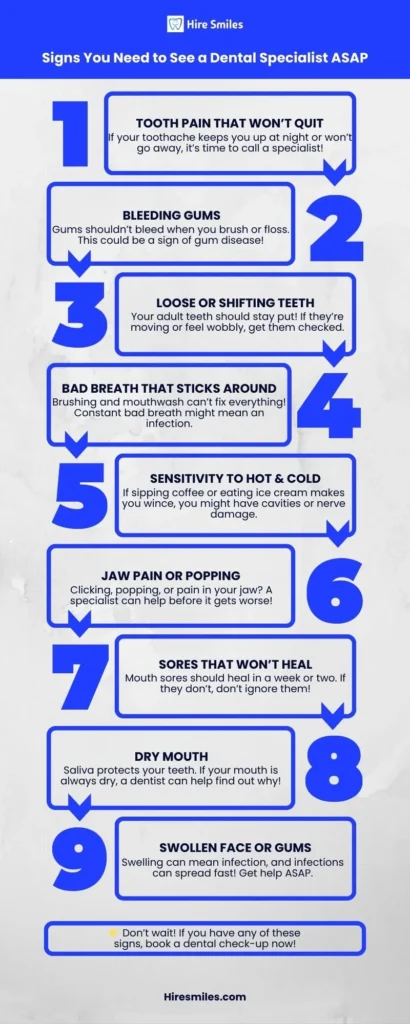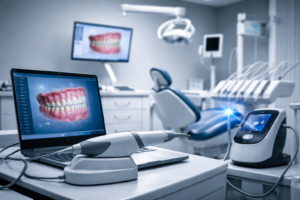Maintaining healthy teeth affects overall wellness. But brushing and flossing alone can’t stop all oral problems. Spotting certain symptoms requires a dentist’s attention. So, don’t overlook these ten symptoms. Here is a breakdown of 10 signs you need to see a dental specialist ASAP:
1. Unending Toothache Continuous
Tooth pain is a red flag. It could be cavities, infections, or gum diseases. A dentist can find the underlying cause and give the right treatment to ease your pain.2. Gums That Bleed Bleeding
While brushing or flossing may suggest gum diseases like gingivitis or periodontitis. Untreated, these can cause tooth loss and worsen your health. A periodontist is apt to cure gum conditions and renew your gum health.3. Red, Puffy Gums
Inflammation of gums usually hints at infection or irritation. If you find your gums appear red, tender, or puffy, see a specialist. It could be an abscess or severe gum disease.4. Wobbly Teeth Permanent
Adult teeth shouldn’t shake. If you feel your teeth shifting, it could signal bone loss, gum disease, or trauma. A dentist can evaluate the issue and propose treatments, such as bone grafting or splinting.5. Chronic Bad Breath or Taste Chronic
Bad breath, resistance to brushing could indicate gum disease or infection. Similarly, if you constantly taste something awful, you might have a dental abscess. See a dentist for diagnosis and treatment.6. Discomfort in Jaw Pain
Rigidity or clicking in your jaw might highlight temporomandibular joint (TMJ) disorders. Complexities with TMJ could restrict you from eating, talking, or fully opening your mouth. An oral surgeon or TMJ specialist can provide alleviation through therapy or potential treatments.7. Altered Bite Teeth
Not fitting right when closing your mouth could be from shifting teeth, jaw problems, or orthodontic troubles. An orthodontist can reposition your bite and stave off more issues.8. Non-Healing Mouth Sores
Sores in your mouth, like ulcers or lesions, not healing after two weeks need a specialist’s inspection. Long-lasting sores might symbolize oral cancer or other severe conditions. Early detection is key to successful treatment.9. White Spots on Teeth or Gums
White spots on teeth might flag beginning tooth decay, and such spots on gums might denote infection or leukoplakia (a precancerous condition). A dentist can find the root cause and suggest a suitable cure.10. Challenges in Eating or Speaking
Struggling to chew, talk, or move your jaw calls for a dentist visit. These inconveniences could stem from misaligned teeth, TMJ disorders, or other dental complications demanding expert intervention.Conclusion
Routine dentist appointments are key to avoiding health issues, yet if these ten signs pop up, book a visit with a dentist instant. Dealing with oral issues early prevents later discomfort, hardship, and fallout. Never forget, your teeth’ health plays a huge role in your total health.FAQs
When would you consider getting dental care?
A toothache is the most common sign indicating. Various dental issues can spur pain, needing professional attention. Damaged teeth, cavities and abscesses might create discomfort, and they must be attended to quickly.What does tooth recession imply?
It’s when your gums retract from your teeth, revealing the roots beneath. This leaves your teeth at risk of cavities. Brushing or consuming food could cause more sensitivity in your teeth. Gum receding can vary from mild to severe, impacting one or several teeth.Don’t Ignore the Warning Signs – Protect Your Smile Today!
If you’re experiencing any of these 10 signs, it’s time to take action and see a dental specialist. Early treatment can save you from pain, costly procedures, and long-term health issues. Don’t wait until it’s too late!Infographic






